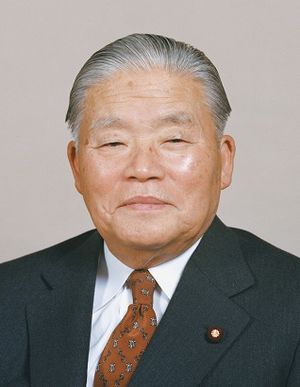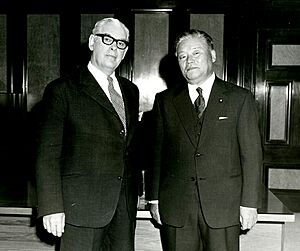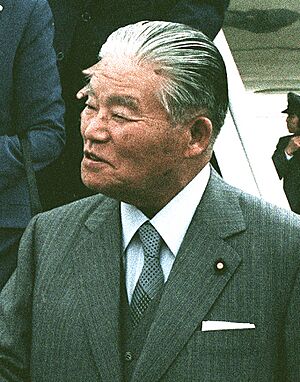Masayoshi Ōhira facts for kids
Quick facts for kids
Masayoshi Ōhira
|
|
|---|---|
|
大平 正芳
|
|
 |
|
| Prime Minister of Japan | |
| In office 7 December 1978 – 12 June 1980 |
|
| Monarch | Shōwa |
| Preceded by | Takeo Fukuda |
| Succeeded by | Masayoshi Itō (acting) |
| Minister of Finance | |
| In office 16 July 1974 – 24 December 1976 |
|
| Prime Minister | Kakuei Tanaka Takeo Miki |
| Preceded by | Takeo Fukuda |
| Succeeded by | Hideo Bo |
| Minister for Foreign Affairs | |
| In office 7 July 1972 – 16 July 1974 |
|
| Prime Minister | Kakuei Tanaka |
| Preceded by | Takeo Fukuda |
| Succeeded by | Toshio Kimura |
| Minister of International Trade and Industry | |
| In office 30 November 1968 – 14 January 1970 |
|
| Prime Minister | Eisaku Satō |
| Preceded by | Etsusaburo Shiina |
| Succeeded by | Kiichi Miyazawa |
| Minister for Foreign Affairs | |
| In office 18 July 1962 – 18 July 1964 |
|
| Prime Minister | Hayato Ikeda |
| Preceded by | Zentaro Kosaka |
| Succeeded by | Etsusaburo Shiina |
| Chief Cabinet Secretary | |
| In office 19 July 1960 – 18 July 1962 |
|
| Prime Minister | Hayato Ikeda |
| Preceded by | Etsusaburo Shiina |
| Succeeded by | Yasumi Kurogane |
| Member of the House of Representatives | |
| In office 1 October 1952 – 12 June 1980 |
|
| Personal details | |
| Born | 12 March 1910 Kan'onji, Empire of Japan |
| Died | 12 June 1980 (aged 70) Minato, Tokyo, Japan |
| Political party | Liberal Democratic |
| Spouse | Shigeko (1916–1990) |
| Children | 4 |
| Alma mater | Hitotsubashi University |
| Signature |  |
Masayoshi Ōhira (大平 正芳, Ōhira Masayoshi, 12 March 1910 – 12 June 1980) was an important Japanese politician. He served as the Prime Minister of Japan from 1978 until his death in 1980. He is the most recent Japanese Prime Minister to pass away while still in office.
Contents
Early Life and Education
Masayoshi Ōhira was born on March 12, 1910, in Wada, Kagawa Prefecture, Japan. He was the third son in a farming family. His father was involved in the local village council, even though he hadn't received much schooling.
Ōhira had eight brothers and sisters, but sadly, two of them passed away when they were very young. Even though his family was considered middle-class, his parents worked hard to support their six children. Young Ōhira often helped with their side jobs.
When he was 16, Ōhira became very sick with typhoid fever and almost died. This experience led him to become a Christian around that time.
In 1933, at age 23, Ōhira earned two scholarships. This allowed him to attend the Tokyo University of Commerce (now Hitotsubashi University), where he studied economics. After graduating in 1936, he joined the Ministry of Finance. There, he became a close assistant to Hayato Ikeda, who would later become Prime Minister.
Ōhira continued to work in the Ministry of Finance during World War II. After the war, when Ikeda became the Minister of Finance from 1949 to 1952, Ōhira served as his private secretary.
Beginning a Political Career
In 1952, encouraged by Hayato Ikeda, Ōhira decided to run for office. He won a seat in the House of Representatives of the Japanese National Diet. He would be elected to this position 10 times in total. He first represented the Liberal Party, and later the Liberal Democratic Party (LDP).
By 1957, as Ikeda prepared to try and become prime minister, Ōhira helped create Ikeda's "Kōchikai" think tank. He was seen as Ikeda's trusted "right-hand man." He helped Ikeda write speeches and plans for elections.
Becoming a Leader
Hayato Ikeda became prime minister in 1960. This happened after Nobusuke Kishi resigned following big protests. As a trained economist and a trusted member of Ikeda's team, Ōhira helped create a plan called the Income Doubling Plan. This plan helped Japan focus on growing its economy and became very successful.
From 1962 to 1964, Ōhira served as Ikeda's Foreign Minister. In this role, he managed important talks that led to Japan improving its relationship with South Korea in 1965. After Ikeda passed away in 1964, Ōhira took over leadership of his political group.

Ōhira became a very important figure within the Liberal Democratic Party (LDP). He often disagreed with Prime Minister Takeo Fukuda. From 1968 to 1970, Ōhira was the Minister of International Trade and Industry under Prime Minister Eisaku Satō.
In 1972, Ōhira tried to become the leader of the LDP but didn't win. He then supported Kakuei Tanaka, who became the new leader. As a reward, Ōhira was made Tanaka's first Foreign Minister, a position he held until mid-1974. In July 1974, he became the Minister of Finance.
Prime Minister of Japan
Ōhira was elected as the president of the LDP in late 1978. On December 7, 1978, he became the 68th Prime Minister of Japan. He took over from his longtime political rival, Takeo Fukuda.
Ōhira was the sixth Christian to hold the office of Prime Minister in Japan.
In the 1979 general election, the LDP did not win a clear majority of seats. However, enough independent members of the Diet joined the party. This allowed Ōhira to remain in office, and he was reappointed Prime Minister on November 9, 1979.
On May 16, 1980, a vote of no confidence was held in the Diet. This vote means that members of the Diet no longer have faith in the Prime Minister's leadership. Ōhira expected the motion to fail, so he was very surprised when it passed. Many members of his own LDP party, including Fukuda, did not vote.
Given the choice to resign or call for new elections, Ōhira chose to call new elections. He began campaigning for LDP candidates. However, he was hospitalized for exhaustion on May 31 and sadly passed away from a heart attack 12 days later.
After his death, Chief Cabinet Secretary Masayoshi Ito temporarily took his place. Yoshio Sakurauchi, the Secretary General of the LDP, led the party to a big victory in the election. Many people believe this was due to a "sympathy vote" after Ōhira's death. Zenkō Suzuki became the next Prime Minister after the election.
Personal Life and Beliefs
Ōhira became a Christian while studying at the Takamatsu Higher School of Commerce (now Takamatsu College of Economics). He didn't formally join a specific Christian group at that time. However, some sources say he was a member of the Anglican Church in the 1970s.
Honors and Recognition
- Grand Cordon of the Order of the Chrysanthemum (June 12, 1980; awarded after his death)
- Golden Pheasant Award from the Scout Association of Japan (1980)
- In Mexico City, Mexico, a park was named after him.
International Honors
 Belgium: Order of Leopold (January 20, 1964)
Belgium: Order of Leopold (January 20, 1964) Malaya: Honorary Grand Commander of the Order of the Defender of the Realm (1964)
Malaya: Honorary Grand Commander of the Order of the Defender of the Realm (1964) Brazil: Order of the Southern Cross (September 16, 1976)
Brazil: Order of the Southern Cross (September 16, 1976)
See also
- Christianity in Japan
 In Spanish: Masayoshi Ōhira para niños
In Spanish: Masayoshi Ōhira para niños
 | John T. Biggers |
 | Thomas Blackshear |
 | Mark Bradford |
 | Beverly Buchanan |


